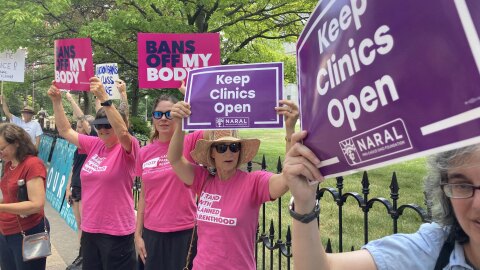The ACLU of Ohio, on behalf of the Ohio chapters of the National Association of Social Workers (NASW-Ohio) and Women Have Options (WHO-Ohio), is challenging a law that was passed last May by the southwestern Ohio city of Lebanon that bans abortion within its borders.
While the Lebanon ordinance wouldn't charge a woman receiving an abortion with a crime, part of it would make it illegal to "aid and abet" someone who is getting an abortion outside Lebanon. Jessie Hill with the ACLU Of Ohio said under this new law, the city could charge people who provide assistance for women who receive abortions.
“It’s just one more attempt to ban abortion at all costs, including by chilling and intimidating people and cutting off protected free speech,” Hill said.
There are no abortion clinics in Lebanon and none are planned to be located in the city.
The groups bringing the lawsuit help pregnant people with funds for the procedure, child care while they are undergoing it, or transportation to get to and from clinics. The ACLU of Ohio's lawsuit against Lebanon challenges the new law saying it violates constitutional protections including due process and free speech.
The ordinance is one of more than 40 already in place throughout the country. Most of them have not yet been challenged in court.
Ohio Right to Life President Mike Gonidakis said the argument that the Lebanon ban violates the constitutional right of free speech is "a stretch at best." He said Ohio already has laws on the books for aiding and abetting a crime and those would apply in the case of laws that would ban abortion. But he said the Lebanon ordinance, in his opinion, does not violate free speech rights.
"Simply speaking, I don't believe that the way the ordinance is written would prevent someone from talking to someone about such a procedure but it does prohibit from aiding and abetting, transporting or helping that way," said Gonidakis.
This lawsuit has been filed in the wake of a leaked U.S. Supreme Court draft opinion that indicated Roe v. Wade, the precedent that makes abortion legal throughout the country, will likely be overturned next month. The nation's highest court has three new conservative members who, as part of the majority in the opinion, wish to overturn the 1973 landmark decision. If that happens, it will be up to individual states whether to allow abortion. Ohio has two bills pending, one in the Ohio House and another in the Ohio Senate that, if passed, could immediately ban abortions in the state. That "trigger ban" is sponsored by a third of the Republicans in the Ohio House.
Ohio has also passed and signed into law a bill that bans abortion at the point a fetal heartbeat is detected. The law has been put on hold by a federal court but Attorney General Dave Yost said he thinks a U.S. Supreme Court ruling overturning Roe v. Wade could make it possible for that law, known commonly as the "heartbeat bill" to go into effect immediately.
"If Roe and Casey do in fact get overturned, then I would anticipate that we would move to lift that stay and that law passed by the general assembly would become effective," Yost said.
Copyright 2022 The Statehouse News Bureau. To see more, visit The Statehouse News Bureau.




